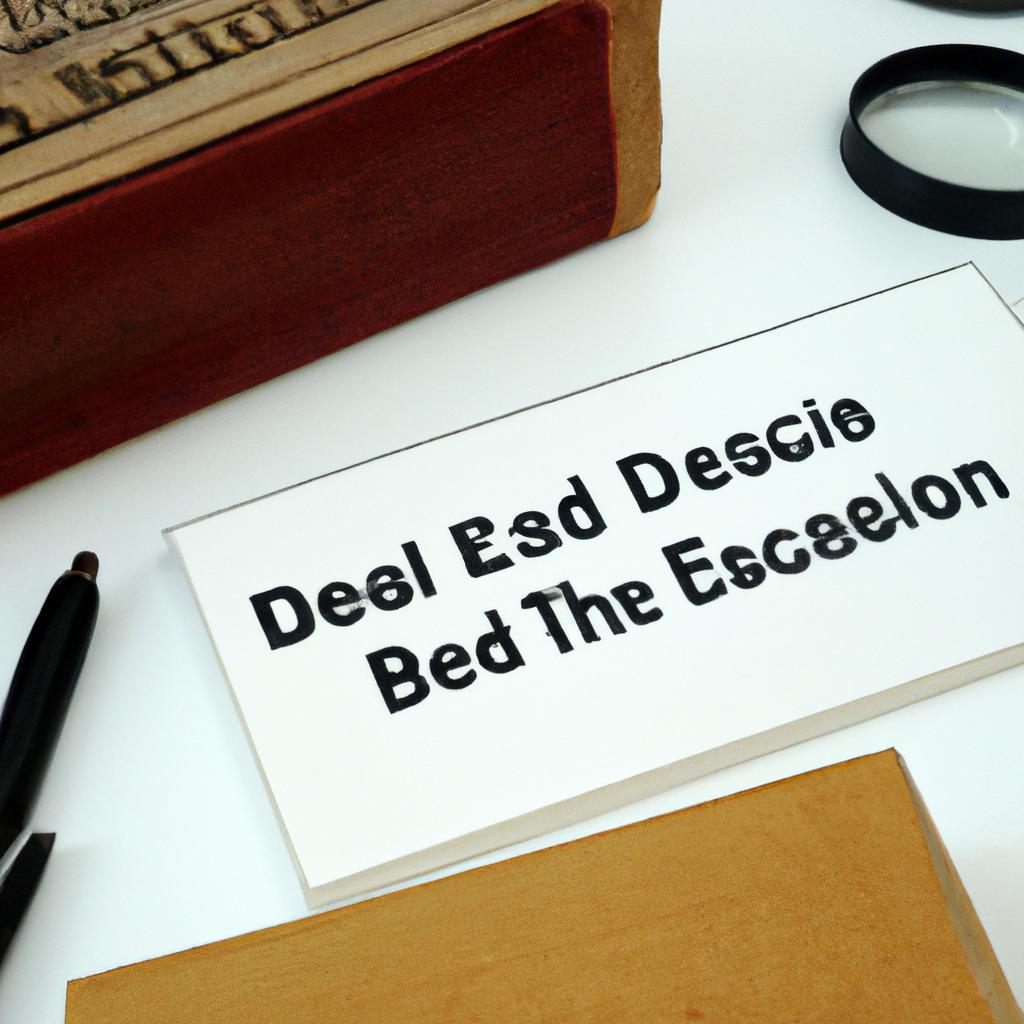In the realm of real estate transactions, the type of deed used can have significant legal implications. From warranty deeds to quitclaim deeds, the nuances of each type play a crucial role in the transfer of property rights. As experienced estate planning attorneys at Morgan Legal Group in New York City, we understand the importance of selecting the appropriate type of deed to protect our clients’ interests. Join us as we delve into the different types of deeds and explore their unique characteristics and functions.
Understanding the Basics of Deeds in Real Estate Transactions
In real estate transactions, there are several different types of deeds that can be used to transfer property ownership. Each type of deed offers different levels of protection to the buyer and seller, and it is important to understand the differences between them before entering into a real estate transaction.
Some of the most common types of deeds include:
- General Warranty Deed: This type of deed offers the highest level of protection to the buyer, as the seller guarantees that they have clear title to the property and will defend against any claims to the title.
- Special Warranty Deed: This type of deed offers less protection to the buyer, as the seller only guarantees that they have not done anything to harm the title during the time they owned the property.
- Quitclaim Deed: This type of deed offers the least protection to the buyer, as the seller makes no guarantees about the title and simply transfers their interest in the property to the buyer.

Exploring the Various Types of Deeds and Their Implications
When it comes to real estate transactions, understanding the different types of deeds is crucial to ensuring a smooth transfer of property ownership. One of the most common types of deeds is the general warranty deed, which provides the highest level of protection for the buyer. This type of deed guarantees that the seller owns the property free and clear of any liens or other encumbrances.
On the other hand, a quitclaim deed is often used in situations where the seller is not making any guarantees about the property’s title. This type of deed simply transfers whatever interest the seller may have in the property to the buyer. It is important to carefully review the terms of the deed before accepting it, as it may not provide the same level of protection as a general warranty deed. Additionally, there are other types of deeds such as special warranty deeds, bargain and sale deeds, and grant deeds, each with its own implications and legal ramifications.

Analyzing the Importance of Choosing the Right Deed for Your Property
When it comes to protecting your property interests, choosing the right deed is crucial. There are several types of deeds that can be used to transfer property ownership, each with its own unique features and implications. Understanding the differences between these deeds is essential for ensuring that your property rights are accurately conveyed and protected. Let’s take a closer look at some of the most common types of deeds:
1. Warranty Deed: This type of deed provides the highest level of protection for the buyer, as the seller guarantees that they have clear title to the property and the right to sell it. A warranty deed also includes a promise to defend the buyer’s ownership rights against any future claims.

Expert Recommendations for Selecting the Appropriate Deed for Your Estate
When it comes to selecting the appropriate deed for your estate, there are several factors to consider. First and foremost, it is essential to understand the different types of deeds available to ensure that your wishes are accurately reflected in your estate planning documents.
- Quitclaim Deed: A quitclaim deed is often used to transfer property between family members or to clear up title issues. However, it does not provide any guarantee of ownership or protection against any future claims.
- Warranty Deed: A warranty deed offers the highest level of protection to the buyer, as it guarantees that the seller owns the property and has the right to sell it. This type of deed also provides a promise that the property is free of any liens or encumbrances.
| Type of Deed | Level of Protection |
|---|---|
| Quitclaim Deed | Minimal |
| Warranty Deed | High |
It is crucial to consult with an experienced estate planning attorney to determine which type of deed is best suited for your individual circumstances. At Morgan Legal Group, our team of professionals has the knowledge and expertise to guide you through the process of selecting the appropriate deed for your estate, ensuring that your wishes are carried out according to your specifications.
Q&A
Q: What is a warranty deed?
A: A warranty deed is a type of deed that guarantees a clear title to a property and provides the buyer with legal recourse if any issues arise.
Q: What is a quitclaim deed?
A: A quitclaim deed is a type of deed that transfers a property owner’s interest in a property to another party without making any guarantees about the title.
Q: How is a grant deed different from a warranty deed?
A: A grant deed is similar to a warranty deed in that it guarantees the title against any claims, but it does not provide as much legal protection as a warranty deed.
Q: What is a special warranty deed?
A: A special warranty deed is a type of deed where the seller only guarantees the title for the time they owned the property, rather than the entire history of ownership.
Q: Can you explain what a gift deed is?
A: A gift deed is a type of deed where a property owner transfers ownership of a property to another party as a gift, typically without any exchange of money.
Closing Remarks
In conclusion, understanding the various types of deeds in real estate is crucial for both buyers and sellers. Whether you’re dealing with a warranty deed, quitclaim deed, or special warranty deed, each has its own unique implications and legal ramifications. By being informed and knowledgeable about these different types of deeds, you can navigate the real estate transaction process with confidence and clarity. Ultimately, choosing the right type of deed can make all the difference in ensuring a smooth and successful transfer of property ownership. So, next time you’re involved in a real estate transaction, remember to consider the type of deed that best suits your needs and goals. Happy house hunting!
 Types of Deeds: Exploring the Different Ways to Transfer Property
Types of Deeds: Exploring the Different Ways to Transfer Property
In the world of real estate, deeds play a crucial role in transferring ownership of property from one party to another. A deed is a legal document that serves as proof of ownership and grants the owner certain rights and responsibilities.
While there are many types of deeds, they all serve the same purpose – transferring the title of real estate. However, the type of deed used can have significant implications on the rights and duties of both the buyer and seller. In this article, we will explore the different types of deeds and their unique characteristics.
General Warranty Deed
A general warranty deed is one of the most commonly used types of deeds in real estate transactions. This type of deed guarantees the buyer that the seller owns the property and has the right to sell it. Additionally, it also ensures that there are no outstanding liens or encumbrances on the property.
As a buyer, a general warranty deed offers the highest level of protection as it provides you with a legal recourse if any issues arise with the title. It also includes a general warranty of title, which means the seller is responsible for any defects in the title that may have occurred before or during their ownership.
Special Warranty Deed
Similar to a general warranty deed, a special warranty deed also guarantees the buyer that the seller owns the property and has the right to sell it. However, unlike a general warranty deed, a special warranty deed only offers protection against defects in the title that occurred during the seller’s ownership.
In other words, a special warranty deed does not provide any protection for issues that may have arisen before the seller acquired the property. This type of deed is commonly used in commercial real estate transactions where the seller may not have the same level of knowledge about the property’s history as a residential seller.
Quitclaim Deed
A quitclaim deed is a type of deed that transfers a party’s interest in a property to another party. Unlike the previous two deeds, a quitclaim deed does not guarantee the seller’s ownership or protect the buyer against any title issues. Instead, it simply transfers whatever interest the seller may have in the property to the buyer.
This type of deed is commonly used in situations where the property is being transferred within a family or to correct an error in the title. It is not recommended to use a quitclaim deed when purchasing a property as it offers no protection to the buyer.
Deed of Trust
While not technically a deed, a deed of trust is often used in real estate transactions in place of a mortgage. In this type of agreement, the borrower transfers the title of the property to a trustee who holds on to it until the loan is repaid. Once the loan is paid off, the trustee transfers the title to the borrower.
The benefit of a deed of trust for the borrower is that it allows them to avoid the lengthy and costly foreclosure process in the event of default. It often includes a power of sale clause, which gives the trustee the power to sell the property in the case of default and use the proceeds to repay the loan.
Life Estate Deed
A life estate deed is a type of deed commonly used in estate planning. It allows a property owner to transfer the title of their property to someone else while retaining the right to use and live on the property until their death. This type of deed can be useful in avoiding probate and ensuring the intended beneficiary receives the property.
Revocable and Irrevocable Deed
Revocable and irrevocable deeds are two different types of deeds that refer to the transfer of property into a trust. A trust is a legal arrangement where a trustee holds and manages assets for the benefit of a beneficiary.
A revocable trust allows the grantor (the person creating the trust) to reserve the right to revoke or change the trust at any time. This type of deed can be advantageous for estate planning as it allows the grantor to make changes if their circumstances change.
On the other hand, an irrevocable trust cannot be changed once it is established. This type of trust provides more protection for the property as it cannot be seized by creditors and may offer tax benefits for the grantor.
Conclusion
In conclusion, there are several types of deeds that serve different purposes in transferring property ownership. As a buyer, it is crucial to understand the type of deed being used in a real estate transaction as it can impact your rights and responsibilities. Consulting with a real estate attorney can help ensure that you are protected in the property transfer process.
Whether you are buying or selling a property, knowing the different types of deeds available and their unique characteristics is essential. Each type of deed offers different levels of protection and rights for both parties involved in the real estate transaction. Carefully consider which type of deed is most appropriate for your situation and seek expert advice when necessary.


